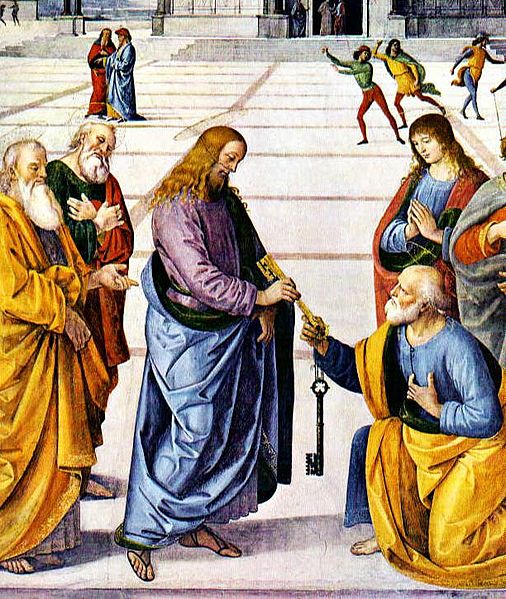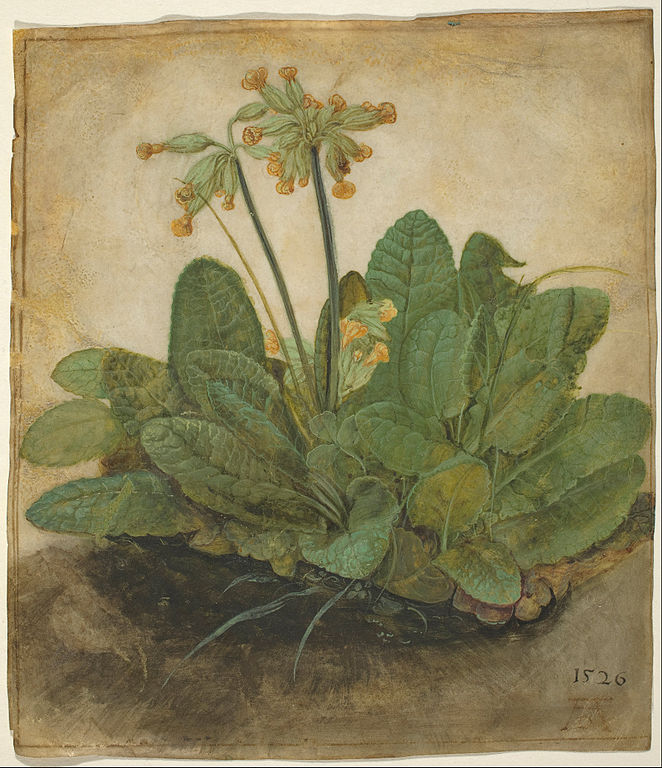The Key of Heaven: A Fairy Tale

Perugino, “Christ giving Peter the Keys to Kingdom of Heaven”; Sistine Chapel, Vatican.
Once upon a time, there was a very great and powerful king who ruled over many lands. All the treasures of the earth belonged to him, and he sported daily with the precious gemstones of Ophir and the roses of Damascus. But with all his great wealth and his great kingdom, there was still one thing he lacked, and that was the key to the gate of heaven.
He had sent out a thousand messengers to search for the key of heaven, but none could bring it to him. He had asked many wise men who had come to his court where one might find the key of heaven, but none of them had known the answer. Only one, a man from India with strange eyes, who smiled, pushing aside the precious gems of Ophir and the roses of Damascus with which the king sported, said to him: “All the treasures of the earth may be received as presents, but each person must seek individually for the key of heaven.”
Then the king decided to find the key to heaven, whatever the cost might be.
Now this was at a time when people still were able to see where heaven reached down to the earth, and they knew of the high mountain-peak upon which the gates of heaven had been built.
The king left his court-servants behind, and he climbed up the steep mountain until he had come to the gates of heaven. Before the gates, the battlements of which were flooded with sunlight, there stood the angel Gabriel, the guardian of God’s eternal garden.
“O angel so worthy of glory!” said the king, “I have all the treasures of the earth; many lands are subject to me, and I play with the precious gems of Ophir and the roses of Damascus, but I have no peace as long as I do not have the key to heaven as well. For otherwise how shall I ever open this golden gate?”
“That is correct,” said the angel Gabriel. “Without the key to heaven you cannot open the gate of heaven, even though you have all the powers and treasures of the earth. But indeed, the keys of heaven are easy to find. They bloom in small flowers when it is spring on earth and in the souls of all creatures.”

“Cowslip” by Albrecht Dürer; courtesy Hammer Collection, London.
“What?” asked the king with astonishment. “I don’t need to do anything more than pick a small flower? The meadows and forests are full of them, and a person walks over so many keys of heaven along the way.” [In the original German the word for “cowslip flower” is “himmelschlussel” which literally means “key of heaven.”]
“It is true that men tramp all over the many ‘keys of heaven’ with their feet,” said the angel. “But though you think it’s so easy, it’s not really quite that simple. There must be three keys of heaven which will unlock the gate for you, and all three are really and truly keys of heaven only if they blossom at your feet for you. The many thousands of other ‘keys of heaven’ flowers should remind people of the true key of heaven which they must bring into blossom, and those are the flowers which they walk all over with their feet.”
At that moment a child came before the gate of heaven, holding three small keys in his hand, three shining flowers. As the child touched the gate of heaven with the three keys of heaven, indeed, the gates opened up wide for him, and the angel Gabriel let him into heaven. But the gates closed again and the king remained alone, standing before the closed gates. Then he thoughtfully went back down the mountain, back to the earth. There, all over the meadows and in the forests, was the lovely cowslip “key of heaven.”
The king was careful not to step on the blossoms, but no flowers bloomed at his feet.
Many years passed, and the king still had not found the keys to heaven. “Shall I never find the true keys to heaven?” asked the king. “Even though a child has found them?”
Then one day he rode out with his court servants, and a grimy and neglected child who had no father or mother begged from him as he and his glittering entourage approached.
“Go beg somewhere else,” said the courtiers, pushing the child aside. But the king, during all the years since he had come down from the steep mountain, had been reflecting much on the keys of heaven, and he never walked all over them any more.
He took the dirty beggar child, clasped her to himself, per her on his horse, and brought her home. There he let her eat and gave her new clothes to wear. He cared for her, adorned her, and fastened a crown to her head. Then at his feet a small golden key of heaven bloomed. The king let it be proclaimed that the poor and the children in his kingdom were his brothers and his sisters.
Again, more years passed, and the king rode into the forest with his courtiers. Then he saw a sick wolf, who was suffering, and could not move or help himself.
“Let him perish!” said the courtiers, placing themselves between the king and the miserable beast.
But the king took the sick wolf and carried him in his own arms into his palace. He fed and looked after him, until the wolf was healthy, and the wolf became his faithful companion, never shrinking from his presence. Then a second golden key of heaven bloomed up at the feet of the king. And the king let it be proclaimed that from now on, all the creatures in his kingdom were his brothers and his sisters.
Again, years passed, but not as much time as the time that went by in his life before he found the first key of heaven, and the king walked around in his garden and gladdened himself with all the rare flowers which were so skillfully cared for and nourished, making his garden one of the most glorious in all the world.
Then the king saw a small unlovely plant by the wayside, about to die of thirst. Its leaves were dusty, and it was wilting in the heat of the burning sun.
“I shall bring you some water,” said the king.
But the gardener stopped him. “It’s just a weed,” he said. “I’ll pull it up and burn it. It’s not fit for the royal garden with all its glorious flowers.”
But the king took his golden helmet, filled it with water, and brought it to the plant, and the plant drank, and began to breathe and live again. Then at the king’s feet a third key of heaven bloomed, and the beggar child with the crown, and the wolf too, stood nearby. And the king saw that up on the steep mountain the gates of heaven stood wide, wide open. He saw the angel Gabriel and the child who had previously found the way into heaven.
The three keys of heaven still bloom today, and they are yours, you know, and today they are still bright—as bright as the precious gems of Ophir and more beautiful than all the roses of Damascus.
A NOTE ON THE TEXT: The German original of this story, “Himmelschlüssel”, was published in Märchen, Stuttgart/Heilbronn: Walter Seifert Verlag, 1922.
EDITOR’S NOTE: Besides the information given in the Preface, we might also recommend this informative German language site on Kyber’s life and writings. There is also an amazon.com page listing some of Kyber’s English language editions. “The Key of Heaven” has been newly translated from the German by our Literary Editor, William J. Jackson. For further information about William, and links to his other postings, please click on his Author’s page link.




